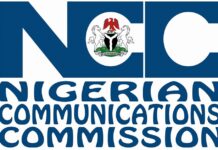• NCC To Send N65b Subsidy for Infracos to FEC Soon
By Aaron Ukodie
The Nigerian Communications Commission (NCC) has begun a test run of 5G, the latest technology for delivering broadband services and such other services as Internet of Things (IOT). The trial will last for three months. Nigeria hopes to join other countries who are in a rush to deploy the 5G technology because of its immense promise for digital communication.
Also the NCC said the Commission was at the verge of sending the N65 billion it plans to give as support to the six infrastructure companies licensed to roll out broadband infrastructure across the country, to the federal executive council for approval.
NCC’s Director of Technical Services, Bako Wakil who made the announcement yesterday in Lagos declined to name the mobile network operator that is involved in the test run. He said however that the company already has the required frequency to run the 5G.
Wakil, who spoke at the Mobile and Disruptive Technology Forum organized by TechEconomy said all the major 5G system vendors in the country, Huawei, Nokia, Ericsson, ZTE are involved in the test which would determine whether 5G is achievable on the country’s current network configuration.
It should be noted, however, that Nigeria network is still predominantly covered by the 3G technology. There are pockets of 4G networks here and there.
Though Wakil did not say what would happen after the end of the test run, the NCC tradition is that once it determines that Nigerian operators can roll out 5G technology and provide the services, it would commence the process of engaging the industry stakeholders on the best way to license the technology deployment.
Expectedly, the country is expected to earn huge revenue from 5G licensing, in line with the global trends. Recently Germany earned $8 billion from four companies who secured the license to provide 5G services. The auction in United Kingdom raised $27.3 billion from four operators.
All the system suppliers involved in the test are already rolling out 5G for several countries in Europe, Asia and the United State.
Called 5G, the fifth generation of mobile wireless communications promises to lower latency, offer greater stability, the ability to connect many more devices at once, and move more data with faster speeds than its predecessor, the 4G.
Many industry experts believe that 5G networks alongside existing 4G LTE networks will be 10 to 20 times faster than 4G when fully deployed in the real world. Standalone 5G could reach gigabit-plus browsing speeds, making mobile internet as fast, if not faster, than hardwired fiber connections.
Gartner reports that global 5G wireless network infrastructure revenue will reach $4.2 billion by the year 2020.
On the Infraco fundng, Wakil said the delay in the approval of the N65 billion subsidy funding for the companies licensed to roll out the broadband infrastructure across the country was due to delays arising from the negotiations between the Commission and the companies involved that took a long time.
He also said that the Executive Vice Chairman of the NCC is engaging the federal executive council so as to relax the right of way obstacles and reduce multiple taxation that exist in network roll out to ease the work of the infracos













